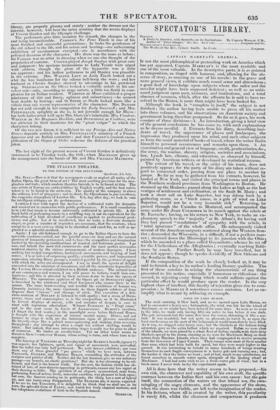THE ITALIAN THEATRE.
TO THE EDITOR OP THE SPECTATOR.
Quadrant, ettlt July.
Mn. Sece.—Ilow is it that the newspapers evade or neglect all notice of the Italian Opera, the great focus of art ? The most exciting provision for the ima- gination and taste, which modern theatres furnish, is to be found at this. The rare artists of Europe are enticed hither by English wealth, and the best native talent is to be found in the orchestra. The quality of the company is above the ordinary level of playgoers; and in short, the Operahouse is, par excellence, the empyrean atmosphere of London life. Yet, day after day, we look in vain for intelligent critiques on its performances. 1 confess I view with regret the decline of in cultivated taste for dramatic and musical art in connexion with publicperformance. It is small consolation to he told that music is become universally cultivated in private life. A dif- fused habit of performing music inn a middling way, is not an equivalent for the cultivation of a high standard of excellence as applied to professional profi- ciency and gifts. Let it be recollected, that to make a hrst-rate dramatic singer, so great a number of requisites are necessary, Butt the creature, when complete, is a rare orris—a thing to be cherished and cared for, as well as ap- plauded as a splendid accident. Again : I am old-linshioned enough to go to the Italian Opera to have the agreeable emotions excited, not the painful ones—to hear and see the natural passions of humanity personated, and to have the sympathies and imagination excited by the charming combinations of musical and histrionic genius. Igo 11010, and behold the most rich endowments and the most perfect accessories rendered abortive by the vicious arrangements of modern nmnagers. 1 hear nothing but insipiid compositions, hackneyed movements, and braying of loud noises. 1 Mar voices of ..iirpassing quality, scientific powers, and impassioned expression, uttering flimsy passages, rendered painful by the gestures of agony with which the notes are accompanied. I see, in short, the agents of delight converted into the ministers of uneasiness, and all the monstrous depravities of the V temoa Hutto school exhibited to a British audience. Tire natural taste of our countrymen and women, I am still prone to believe, would lean con- trariwise; and this is attested by their anxious desire to hear the operas of Mozmur. The uproarious applause of the Opera pit on DoNiznprin nights, is furni:hed by the whiskered and Naze foreigners who swarm there hi the season. The more heart-rending and terrible the exhibition of human wo, (insanity inclusive,) the more vigorously do these foppish arbiters of thine dispense their " bravos " and thumps of stick. Tine execution of a deli- cious morceau of Moz.tur is listened to with apathy ; but a wens of Dom- ZETT1, inane and commonplace as is the composition, so it be illustrated by fervent displays of misery, yells and roulades of despair, is sure to meet with rapturous admiration. Witness PERSIAN' in " I'orgi amor," and in tine mad scene in Lucia di Lammermoor. Runim's cavatina, (1 forget the first words,) in the moonlight scene before llolyrood House, is fraught with the expression of intense mental agony. Bence, and not because he slings it well, are the boisterous signs of pleasure manifested. Ile bterally sings like a palsied man—quivering and shaking from necessity, throughout : any attempt to utter a single bar without slinking, would be futile. ut indeed, this once interesting singer is really too far gone to allow of' comment. He trades on recollections. Yet no other tenor seems to threaten there !—not even MARIO, whose acting is tame, and whose tone is in- compete. the dancing of TAGLIONI on Thursday night for RIMINI'S benefit,(qumre ?) was superb: her lightness, spirit, and vigour of movement, were unrivalled. But the ballet was only half perfOrmed. No male dancer exhibited; nor were there any of those graceful " pas graves " which we have seen, between Taordoxt, GuramE, and Madame BELON, resembling the attitudes of the sculptor and painter of old. Neither did the firir dansense give us one saltatory passage—no bounds, no elastic gyrations! But she is too charming to be cri- ticized, and that is the honest truth. For the rest, the fashion which has ob- tained of late, of men dancers appearing ill petticoats, causes one less regret at their dancing so little. The spectiicle of an elegant, symmetrical, male form, performing teats of active, lively, muscular exertion, was pleasant to look upon ; but now, the dancers coming on in petticoats, the thing has a sort of hybrid air, and one turns away disappointed. The ELSLERS are, it seems, expected. If we are to lose TAGLIONL it is delightful to think that we shall see, in its turn, the splendid form of FANNY, and watch her truly classical motions, and her voluptuous evolutions of limb in tine Spanish dances.
Otnnucx.


























 Previous page
Previous page